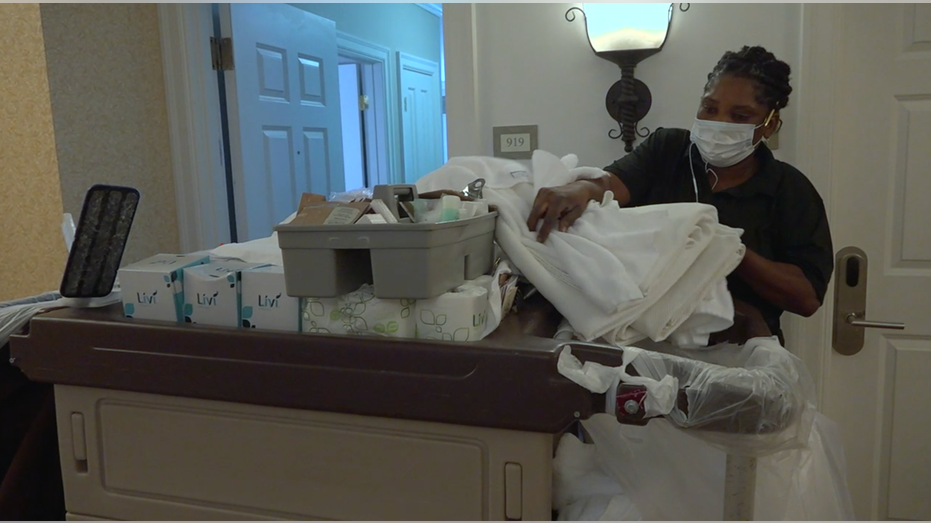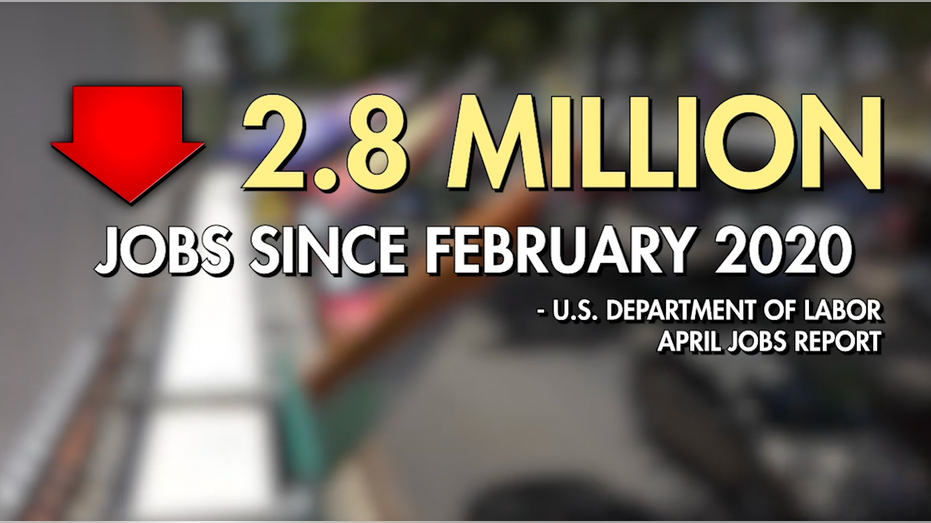Hotel industry struggling with 'labor crisis'
Without sufficient staffs, some hotels have had to turn business away
Hotels facing staffing shortage ahead of summer
Fox News’ Robert Sherman reports on the latest.
FORT LAUDERDALE, Fla. – The sounds of searing scallions and clanking glasses echo around the restaurant in the Riverside Hotel, one of Fort Lauderdale’s many hotels. The guests who fill the outdoor spaces can’t help but rush to the water’s edge to watch the massive yachts and sailboats go by.
The hotel is busy, that much is obvious. However, the family-owned property has had its fair share of struggles in recent months.
"The first four months of this year were the toughest in the three decades I’ve been in this industry," Heiko Dobrikow, who has been the hotel’s general manager for the last 11 years, told Fox News. "And I’ve been through a lot of downturns, from 9/11 to the Great Recession and so forth."
Despite Americans flocking to Florida’s beaches and theme parks and occupying hotels like Dobrikow’s, properties are having a difficult time finding enough employees to meet the demand.

A housekeeper prepares a room at the Riverside Hotel in Fort Lauderdale, Fla. The property is struggling to find enough workers to fill its staff. (Robert Sherman, Fox News).
"It is pretty much across the board," said Dobrikow. "Whether it’s guest service agents, whether it is room attendants, whether it’s housekeepers."
RELATED: Groceries are getting more expensive due to labor shortages across industries
Typically, the hotel has 300 employees. Today, the headcount sits closer to 175. While the team at Riverside has figured out how to make things work while short-staffed, it did hamper the hotel’s ability to operate.
"We had to turn business away," said Dobrikow. "There was a time, a two-week period where we didn’t have enough cooks to prepare the orders for all the guests that were here."
The reality is the Riverside Hotel is not an outlier, and Florida is not the exception to the rule. The industry, as a whole, is down about 2.8 million jobs since pre-pandemic levels in February 2020, according to the April jobs report. The industry unemployment rate of 10.8% outpaces the national rate of 6.1%.

The latest numbers from the April jobs report show the hospitality industry is down over 2 million jobs since February 2020.
Even so, workers are seemingly nowhere to be found.
Carol Dover, CEO of the Florida Restaurant and Lodging Association, said it doesn’t matter if it’s the most glamorous beach resort or a small-town property just off the interstate. Everyone is feeling the pain.
"We do have a labor crisis. We’re actually calling it the ‘new pandemic,’" Dover told Fox News. "Places are closing just because they don’t have staff."
Dover explained that the issue is two-fold. On the one hand, workers in the hospitality industry who were furloughed during the pandemic found employment elsewhere and have no reason to come back. On the other hand, state and federal unemployment benefits are making it so workers feel less incentive to rejoin the labor force.
RELATED: Job openings surge to record 8.1M, but businesses struggling to hire workers
"It’s very obvious that we’re paying people too much money to stay home," said Dover. "Businesses across the country are in straight-line competition with the government because the government is paying them so much money to stay home."
Some hoteliers are trying to incentivize new employees to sign on with higher wages, bonuses, and even more perks, according to Dover. Yet still, the interest in joining an industry ravaged by the pandemic is sparse.
"We’ve had job fairs across the entire state. Nobody shows up," said Dover.
Abraham Pizam, a professor at The University of Central Florida’s Rosen College of Hospitality Management, suspects the industry will see a massive overhaul in the short-term future.
Specifically, he believes hotels will have to adjust the business models to be competitive with not just other hotels but other industries.
"[The hotels] were quick to furlough those employees because they did not have the funds to pay them," Pizam told Fox News. "And so, they went elsewhere. Unfortunately, elsewhere paid better."
"In the long run, they need to restructure themselves to be more competitive in terms of labor with other industries that pay a little bit more."
"Normalcy" is what many aspire for, yet Pizam believes things will never quite be completely as they were before the pandemic hit. But, when it comes to getting back to a similar pre-pandemic position, that could require two to three years of patience.
"To return to what it was. To return to the old normal," said Pizam. "For now, what we will have for the next year is the ‘new normal.’ The new normal is significantly less than the old one, but it’s climbing up gradually."
Dobrikow, however, feels optimistic. He and his staff say they’re trying to get creative, looking to military veterans and fresh graduates to pad their workforce.
His hope is things improve in the fall as more Americans get vaccinated and some pandemic unemployment benefits sunset. A number of states say they will stop paying $300 unemployment checks this summer.
"Hopefully, we as an industry will recover. Hopefully, we will see a labor force feeling more confident in getting back to work," said Dobrikow. "And that’s how we’re gonna have to manage it."





















